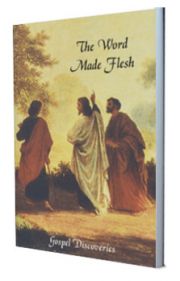We are told in the beginning of the holy Gospel according to Saint John that, “the Word was made flesh and dwelt among us.”
That is a wonderful phrase, “the Word was made flesh.” “Word” has a great deal of meaning for us. Our memories are all tucked away in the shape of words. Our utterances to those we love are impossible without words, and even when we are thinking by ourselves and not speaking, we are somehow wording our thoughts for the hidden ear — which is the bliss of solitude.
Of all man’s achievements, perhaps the most astounding is his wording of a thing. When a little child cannot speak — when he has no words yet — one of the things we do for him is to coax him into word land.
If you were to sit down and think for many years as to how you could best say that the Second Person of the Blessed Trinity became Incarnate — took our nature and dwelt in our midst, breathed our air and walked our roads, looked at our skies and listened to our sounds — I do not think you could possibly get a more chaste, clear, simple, inexhaustible-in-meaning expression of it than to say: “The Word was made flesh and dwelt among us.”
“Word” leaves nothing out. And when you say “flesh,” you get in every single atom of our poor human frailty. If you said, “the Word became man,” or, “the Word moved into our scene,” or, “the Word became one of our children,” there would probably be left out of the realization — for the sake of more lofty, noble,, and impressive values — a great deal of what seems to be commonplace in us, of what is lowly and helpless, and yet of what God did assume.
But when you say, “the Word was made flesh,” the whole man is encompassed in that utterance.
This book is full of illustrations.
Publisher: Saint Benedict Center Abbey (1979)
No posts found


